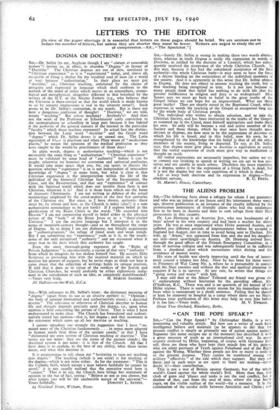LETTERS TO THE EDITOR
[In view of the paper shortage it is essential that letters on these pages should be brief. We are anxious not to reduce the number of letters, but unless they are shorter they must be fewer. Writers are urged to study the art of compression.—Ed., The Spectator. "]
DOGMA OR DOCTRINE?
Sta,—Dr. Selbie (to me, Anglican though I am " clarum et venerabile nomen") invites us, in effect, to abandon " Dogma " in favour of "Doctrine." The Christian dogmas are out of date, unrelated to " Christian experience " as it is " experienced " today, and, above all, incapable of being a shelter for the troubled soul of man (in a world at war) because " authoritarian." In their place we must put "doctrine," i.e., Christian teaching, unfettered by the chains of antiquity and expressed in language which shall conform to the outlook of the mind of today which moves in an atmosphere, cosmo- logical and metaphysical, altogether different to that breathed by the writers of the N.T. or the Nicene Fathers (e.g., who believes that the Universe is three-storied or that the world which is made known to us by sensory impressions is real in the ultimate sense?). Such seems to be Dr. Selbie's contention, in my words. But is there not here a dangerous confusion of thought? " Doctrine," we are told, means " teaching." But whose teaching? . Anybody's? And does not the work of the Professor or Schoolmaster carry conviction to the undergraduate or schoolboy in large part because it has behind it the authority of the general consent of the learned in the particular "faculty" which those teachers represent? In actual fact the distinc- tion between the Latin word doctrine " and the Greek word " dogma " which Dr. Selbie draws is an unreal one. The Latin equivalent of tidwia is placitum and when Pliny wrote of "medicorum placita," he meant the opinions of the medical profession as they were taught to the would-be practitioners of those days!
In plain words, dogma is authoritative teaching—which is not necessarily the same thing as " authoritarian." " Christian experience " must be validated by some kind of " authority " before it can be taught, otherwise tot homines tot sententiae and universal confusion, It would take more space than you, Sir, can spare, to discuss the question whether " experience " is or is not independent of antecedent knowledge of " dogma " in some form, but what is clear is that Christian experience is the interpretation within the life of the individual of the historical Christian facts of the Incarnation, the Cross, and the Resurrection, and that any " experience " of contact with the Spiritual world which does not involve those facts is not Christian, whatever it is! And it is those facts which are the bases of dogmatic Christianity. I am not writing in defence of the actual terminology employed by the creed-makers of the first five centuries of the Christian era. But since, as I have shown, authority there must be, by whom and how, as the Church is today (alas!) is a new authoritative terminology to be put forth? If I express belief in the glorification of the Risen Christ in the words " He ascended into Heaven " I am not committing myself to belief either in the physical nature of the " body " of the Risen Jesus or to a " three-storied Universe." I use the ancient language but I interpret it in the terms of twentieth-century thought—and so on throughout the range of Dogma. In so doing I am not dishonest, nor blindly acquiescent in authoritarianism," the refuge of timid souls and weak minds. But I am submitting my " experience," such as it is, to the touch- stone of the only recognised " authority " and am reassured when it rings true to the facts which that authority has taught.
Even the most thorough-going exponent of the " Right of Private Judgement " is, unconsciously, a victim of that very " authority " from which he imagines he has shaken himself free. He accepts Holy Scripture as providing him with the inspired material on which to exercise his powers of exegesis, but he never stops to think out how it came about that the collection of writings holds its unique position. If told that it does so in virtue of the verdicts of the Jewish and Christian Churches, he would probably be either righteously indig- nant in the repudiation of such an idea, or completely dumbfounded!
—Yours very truly, H. MARTIN SANDERS. All Hallows-on-the-Wall, E.C.2.


































 Previous page
Previous page